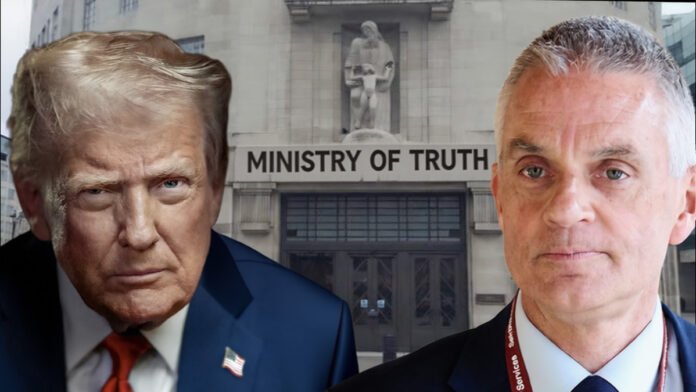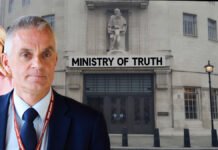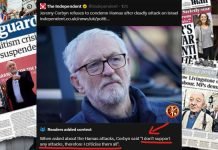As BBC Chiefs Quit, The $1bn Question: What Are You Paying For?
If you’re wondering how the BBC plans to spend your licence fee this year, here’s a clue: it won’t be on impartial journalism.
Donald Trump has threatened to sue the BBC for $1 billion (£760 million) over claims that a Panorama documentary deliberately edited one of his speeches to make it appear as though he was inciting the January 6th Capitol riot.
According to a leaked internal memo, Panorama spliced together two separate parts of Trump’s 2021 speech, misleading viewers into believing he was calling for direct action. The BBC has since admitted it was an “error of judgement”, one that gave the “impression of a direct call for violence.”
That “error,” however, came amid a pile-up of editorial controversies. A Telegraph investigation published last week revealed an internal memo by Michael Prescott, a former external adviser to the BBC’s Editorial Standards Committee. His report accused the corporation of systemic bias, citing one-sided Gaza coverage, anti-Trump and anti-Israel framing, and ideologically skewed transgender reporting.
The fallout was swift. Both Director-General Tim Davie and BBC News CEO Deborah Turness resigned on Sunday under mounting pressure. Turness insisted the BBC was not “institutionally biased,” but the timing says otherwise.
Tim Davie’s background as a former Conservative councillor and party official led to the label “Tory choice”
Davie stood as a councillor for the Conservative Party in Hammersmith in 1993 and 1994.
He was deputy chairman of the Hammersmith and Fulham Conservative Party during the 1990s.
Ironically, at the very start of his BBC job, Davie hit controversy over the decision to play orchestral versions of Rule, Britannia! and Land Of Hope And Glory at the Last Night Of The Proms.
It was said that Davie planned to tackle “left-wing” BBC comedy, according to The Telegraph.
He reportedly believes the broadcaster’s output is seen as too one-sided and needs to be overhauled.
Comedy panel shows were told to book guests with a wider range of views on issues like Brexit. Tory MPs at the time welcomed Davie’s drive to make comedy on the broadcaster more balanced.
In Trump’s speech he said: “We’re going to walk down to the Capitol, and we’re going to cheer on our brave senators and congressmen and women.”
More than 50 minutes later in the speech, he said: “And we fight. We fight like hell.”
In the Panorama programme the clip shows him as saying: “We’re going to walk down to the Capitol… and I’ll be there with you. And we fight. We fight like hell.”
The Prescott Memo: “Systemic Problems of Bias”
Prescott’s memo didn’t just focus on the Trump edit; it raised alarms about wider failures across BBC News, particularly in the BBC Arabic Service and LGBTQ+ coverage.
He cited a lack of action to address “systemic problems” of bias in BBC Arabic’s reporting of the Israel-Gaza conflict, pointing to one-sided narratives and failures in editorial oversight.
BBC chair Samir Shah, in a letter to the Culture, Media and Sport Committee, acknowledged those concerns and confirmed that remedial action has been taken to address the “underlying problems,” including:
- A full restructure of the BBC Arabic team
- Appointment of a new Arabic-speaking Head of Editorial Quality and Standards for the World Service
- Creation of a new social media research unit to verify sources and appearances on the service
Those reforms came only after the memo exposed bias, not before.
🏳️🌈 Trans Coverage “Censored” by Pro-Activist Staff
Perhaps even more telling were Prescott’s remarks on the BBC’s approach to trans issues. He reported that coverage had become “effectively censored” by the corporation’s specialist LGBT reporters, who actively promoted a pro-trans agenda and shut down stories that questioned it.
“I was told that time and time again the LGBTQ desk staffers would decline to cover any story raising difficult questions about the trans debate,”
Prescott wrote.
That isn’t journalism, that’s activism dressed as reporting.
The bias wasn’t confined to the newsroom either. On Thursday, the BBC upheld 20 impartiality complaints after presenter Martine Croxall changed the phrase “pregnant people” to “women” on air, and, according to the corporation’s Executive Complaints Unit, her facial expression gave the “strong impression of expressing a personal view on a controversial matter.”
Think about that: the BBC now considers the word “women” a potentially controversial opinion.
📺 Bias by Design
BBC chair Samir Shah has since apologised for the Panorama edit, admitting it created a false impression, while insisting that the corporation hasn’t “buried” the wider editorial concerns. But the evidence says otherwise.
From selective Gaza coverage and trans-issue censorship to doctored political footage, the BBC’s bias isn’t accidental; it’s institutional. It’s what happens when liberal ideology replaces journalistic integrity, and corporate survival depends on staying in tune with fashionable orthodoxy.
Trump’s legal team, led by Alejandro Brito, has given the BBC until 14 November to issue a “full and fair retraction” or face defamation proceedings under Florida law. The letter accuses the BBC of making “false, defamatory, disparaging, misleading, and inflammatory statements”, in other words, propaganda dressed as news.
Licence Fee Journalism
So while the BBC pleads poverty and squeezes every last penny from your licence fee, remember: this isn’t public service broadcasting, it’s political storytelling, and you’re paying for the narrative.
Impartial? Hardly. Institutional? Absolutely.
Support Independent Journalism Today
Our unwavering dedication is to provide you with unbiased news, diverse perspectives, and insightful opinions. We're on a mission to ensure that those in positions of power are held accountable for their actions, but we can't do it alone. Labour Heartlands is primarily funded by me, Paul Knaggs, and by the generous contributions of readers like you. Your donations keep us going and help us uphold the principles of independent journalism. Join us in our quest for truth, transparency, and accountability – donate today and be a part of our mission!
Like everyone else, we're facing challenges, and we need your help to stay online and continue providing crucial journalism. Every contribution, no matter how small, goes a long way in helping us thrive. By becoming one of our donors, you become a vital part of our mission to uncover the truth and uphold the values of democracy.
While we maintain our independence from political affiliations, we stand united against corruption, injustice, and the erosion of free speech, truth, and democracy. We believe in the power of accurate information in a democracy, and we consider facts non-negotiable.
Your support, no matter the amount, can make a significant impact. Together, we can make a difference and continue our journey toward a more informed and just society.
Thank you for supporting Labour Heartlands












